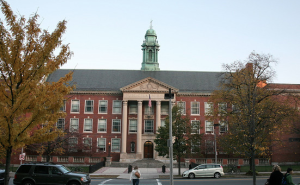In the US and Canada, the failing policies of zero tolerance are giving way in many schools to restorative justice and restorative practices. These schools are demonstrating one after another that restorative practices can successfully reduce suspensions, expulsions and other punitive responses to wrongdoing. Schools using restorative justice address wrongdoing, but they do it in an inclusive way that does not stigmatize students but instead aims to teach and reintegrate them into regular school programming.
In the Kawartha Lakes region in central Ontario, Canada, the local newspaper (Kawartha.com) has reported on significant reductions in suspensions and expulsions at Trillium Lakelands District School Board, which in recent years implemented restorative practices on a district-wide basis.
The data shows that "in the past five years, the number of expulsions and suspensions has declined by almost 500 students, with only one elementary expulsion for the last school year. In total, 1,299 students were suspended or expelled during the last school year compared to 1,800 in 2008/2009. The number of one-day suspensions dropped by roughly 32 per cent in three years, falling from 525 to 355."
Superintendent of Safe Schools Kevin Cutler presented the data to the school board. Cutler has advocated the use of restorative practices, and the article suggests he will continue to research the role of restorative practices and school climate as it relates to student well-being and success.
IIRP Canada started working with the Trillium Lakelands District School Board 3 years ago and during that past year completed the 3 year roll-out of training with all 50 schools and school staff. The district is now licensed to deliver IIRP's introductory "Restorative Practices Framework" and "Circles" trainings.
The Boston Herald also reports a "Sharp drop in suspensions as Boston schools try ‘restorative’  approach," according to reporter Jack Encarnacao. He writes:
approach," according to reporter Jack Encarnacao. He writes:
Boston Public Schools reported suspending or expelling 743 students in 2010 for offenses ranging from sexual assaults to fights to drug and weapons possession, according to data provided to the Herald by the state education department. In one year, that number dropped more than 80 percent, to 137 in 2011, and then to 120 in 2012. ...
In Boston, a system of 57,000 students, the drops coincide with the 2010 revision of the district’s “Code of Discipline” to a “Code of Conduct” that introduced alternatives to suspensions and expulsions called “Restorative Justice,” a method growing in popularity in urban school districts across the country.
According to the policy, restorative justice strives to “provide a safe space” so victims and the school community “have a say in how to fix the problem and help determine appropriate consequences.” ...
Restorative justice is emerging as a “gold standard” of how to resolve conflicts between kids, but it must be applied in the right measure, said Dr. Elizabeth Englander, director of the Massachusetts Aggression Reduction Center at Bridgewater State University... .
Read the full story at the Boston Herald.
